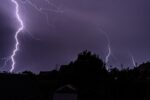Jarring Dodger Stadium Flood Picture Has Fans Wondering What’s Next
By | The New York Times
The Uncharacteristic Flood
The recent flooding at Dodger Stadium in Los Angeles, caused by Tropical Storm Hilary, has left fans shocked and wondering about the future. This uncharacteristic event, in a state known for droughts and wildfires, has brought to light the unpredictability of weather patterns and the need for preparedness.
It is worth noting that California has not experienced a tropical storm since 1997, when Hurricane Nora made landfall. The arrival of Hilary, though downgraded to a tropical storm, has disrupted the normal operations of the Los Angeles Dodgers and raised concerns about the safety of the stadium and surrounding areas.
The Impact of Hilary
The decision to move the Sunday game to Saturday proved to be wise, considering the subsequent flooding at Dodger Stadium. The storm caused significant damage to the venue, and it will take days to assess the full extent of the destruction. The true scope of the flooding may only be known after Monday night, when experts have had more time to evaluate the situation.
The Dodgers have fortunately started a six-game road trip, allowing time for repairs and recovery at Dodger Stadium. The scheduled events at the stadium have also been postponed, easing the burden on the organization. However, the immediate concern lies in the safety of the affected areas, as Hilary continues to move inland.
Unusual Weather and Climate Change
The jarring image of Dodger Stadium under water serves as a reminder of the changing climate and the potential for more extreme weather events. While California is no stranger to natural disasters, the occurrence of a tropical storm highlights the need for communities to be equipped to handle unexpected weather patterns.
Climate change has been a topic of great discussion and concern in recent years. The increase in global temperatures has led to more intense storms and irregular weather patterns. As a society, we must recognize the need for sustainable practices and resilience in the face of these challenges.
Looking Ahead
As Dodger fans anxiously await news of the stadium’s recovery, it is important to remember that this event should serve as a wake-up call for everyone. No longer can we dismiss extreme weather events as isolated incidents. The potential for such events to occur more frequently and with greater intensity is a reality we must confront.
Organizations like the Los Angeles Dodgers should not only focus on the immediate repair of the stadium but also take this opportunity to ensure their infrastructure is equipped to handle future weather challenges. Employing sustainable and climate-resilient practices in construction and maintenance will be crucial for the long-term viability of sports venues and other critical infrastructure.
In addition, individuals and communities must be prepared. Educating ourselves about climate change and actively engaging in sustainable habits can make a significant difference. From reducing our carbon footprint to supporting policies that address climate change, everyone has a role to play in mitigating the impacts of extreme weather events.
Ultimately, the jarring flood at Dodger Stadium is a stark reminder of the need for proactive measures to adapt to the changing climate. It is our responsibility to protect ourselves, our communities, and the places we cherish. Only through collective action and a commitment to sustainability can we hope to navigate the uncertain future that lies ahead.

<< photo by Valiphotos >>
The image is for illustrative purposes only and does not depict the actual situation.




